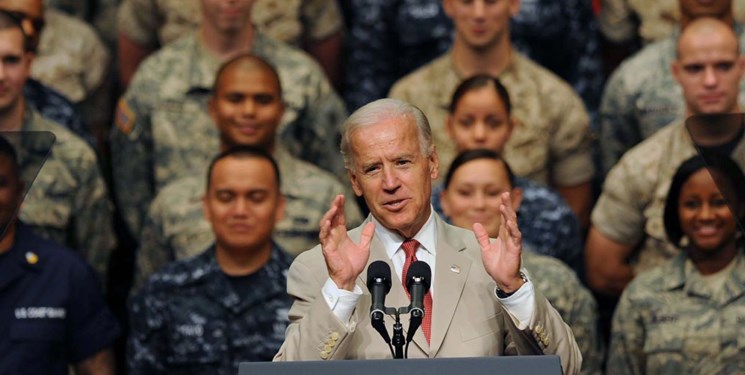Diyako Hosseini told the Strategic Council on Foreign Relations that it seems the Biden government would make efforts to decrease the costs of the United States as well as the amount and intensity of conflicts in the Middle East.
Referring to the necessity of reviewing the misguided US foreign policy in the Middle East, he said the elites in the United States have partly reached the conclusion and have relative consensus that the Middle East region is no longer considered a critical region for the United States compared to the interests of the United States in other regions of the world such as the east and or the North East of Asia which are being threatened by the rise of China.
“It should be also remembered that the Biden administration has no alternative but to deal with the domestic issues of the United States during more than half of his tenure. Issues such as the outbreak of Covid-19 and huge social and partisan gaps will take half of the tenure of Biden.”
Biden less interested in intervention in the Middle East and Far East
Hosseini said that the Biden’s administration has less interest in interfering and engagement in such regions as the Middle East and the Far East, adding that the Biden’s administration is facing a dilemma and big problem concerning the mitigation of costs in a manner that is defensible and prevents the US allies from inferring that it is not a reliable partner.
Referring to the policies of the Trump administration in supporting the Saudi-led invasion of Yemen, Hosseini said that the Biden administration is trying to encourage Saudi Arabia to reconcile in any way in Yemen and recognize Ansarollah as an indispensable part of the peace process in Yemen.
This policy is of utmost significance in attaining peace in Yemen.
He pointed out that the policy of the Trump administration towards Afghanistan may also change as Biden’s team would adopt a more cautious approach.
“The policy of the new US administration towards Afghanistan would be based on a speedy withdrawal from Afghanistan, just like the Trump administration. Of course, it seems that the Biden administration would act more cautiously in this respect and would consider a perspective which proves that the withdrawal of American forces from Afghanistan would result in increasing instability and or return of the radical extremist groups such as Daesh or extremist branch of the Taliban. And in the meantime, the rapid withdrawal of US troops would lead to increasing instability and or return of radical extremist groups such as Daesh and or the extremist branches of the Taliban and would also help boost China’s influence in Afghanistan.”
The director of Global Studies Program of the Center for Strategic Studies added that even though withdrawal of forces from Afghanistan would remain as an objective, the method of such withdrawal would be a matter of discussion and deliberation for the Biden’s administration.
And ultimately, one should wait and see which method will be chosen by Biden for the safe withdrawal from Afghanistan.
Asked about US blunders in Syria, Hosseini said “it seems that the Biden’s administration, as opposed to Trump’s, would make efforts to have a coherent program for the future of Syria even though he will also abstain from overthrowing Bashar al-Asad as the main and immediate objective. However, about Kurds for which Trump had no plan of support and was disinclined towards it, the Biden administration would be interested more in creating a safe zone for the Kurds in Syria especially in northern districts.”
He said that relations between Netanyahu and Biden will no resemble relations between Netanyahu and Trump, adding that it does not appear that we would be witness to a major change in relation to the Zionist regime and Palestine in the new administration of the United States.
“However, Biden would make efforts to keep some of Trump’s legacy in this respect, such as the relocation of the US Embassy from Tel Aviv to Bietul-Muqaddas. However, in the meantime Biden will be openly opposing the policies and behavior of Netanyahu such as the continuation of the construction of illegal settlements which may damage the so-called peace process while trying to preserve some of the Trump’s legacy in this respect such as the relocation of the US Embassy to Bietul-Muqaddas.”
Biden’s efforts to change the misguided policies of the Trump administration in the region
This expert of international issues said it seems that that the Biden administration would partly try to change the misguided policies of the Trump administration in the Middle East.
He added that the Biden administration should try to choose policies which are acceptable for the majority of the countries of the region and are less interventionist and would result in less conflict, bloodshed and even occupation. However, this does not mean that Biden can immediately retrieve the situation to its primary status.
Hosseini added that the Middle East region is suffering from a lot of wounds and has been witness to long wars while millions of people have been displaced and hundreds of thousands of people killed.
“We witness governments in countries such as Iraq, Afghanistan, Syria, Yemen and even Lebanon in extensive political and economic crises as the result of such interventions. Therefore, reforming the misguided methods of Trump cannot lead to immediate heeling of all the wounds.”
Hosseini added that requirements of the advancement of policies are usually different in the field with the declared causes and would end in results totally difference from what the leaders had in mind.
“A situation may arise as the result of the implementation of these policies in the coming months and years which could not be imagined neither by us nor the Americans. Islamic awakening was a the most clear example and when Obama was in power in 2008 and 2009, no one could imagine that a series of riots would emerge which will influence all the scenes.”










0 Comments